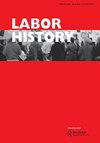按性别划分的职业隔离如何影响西班牙女性就业不足
IF 0.7
4区 管理学
Q1 HISTORY
引用次数: 0
摘要
摘要本文提供了经验证据,证明了2008年和2018年按性别划分的职业隔离(某些职业中女性/男性的代表性过多或不足)对西班牙女性就业和就业不足概率的影响。这一结果似乎与之前的研究结果相矛盾,并表明在女性占主导地位的职业中,只有私营部门的工薪阶层才有更大的就业不足风险,而公共部门的工薪群体则没有。在这类职业中,资历、在私营部门工作以及与受过高等教育的就业伙伴生活是对就业不足概率影响最大的因素。本文章由计算机程序翻译,如有差异,请以英文原文为准。
How occupational segregation by gender affects female underemployment in Spain
ABSTRACT This paper provides empirical evidence on the effect that occupational segregation by gender (excessive or insufficient representation of women/men in certain occupations) has on the probability of employment and underemployment of women in Spain in 2008 and 2018. The results seem to contradict the findings of previous studies and show that in female-dominated occupations, there is a greater risk of underemployment only for wage earners in the private sector, but not for wage earners in the public sector. In this type of occupation, seniority, working in the private sector and living with an employed partner with higher education are the factors that have the greatest influence on the probability of underemployment.
求助全文
通过发布文献求助,成功后即可免费获取论文全文。
去求助
来源期刊

Labor History
Multiple-
CiteScore
1.00
自引率
28.60%
发文量
44
期刊介绍:
Labor History is the pre-eminent journal for historical scholarship on labor. It is thoroughly ecumenical in its approach and showcases the work of labor historians, industrial relations scholars, labor economists, political scientists, sociologists, social movement theorists, business scholars and all others who write about labor issues. Labor History is also committed to geographical and chronological breadth. It publishes work on labor in the US and all other areas of the world. It is concerned with questions of labor in every time period, from the eighteenth century to contemporary events. Labor History provides a forum for all labor scholars, thus helping to bind together a large but fragmented area of study. By embracing all disciplines, time frames and locales, Labor History is the flagship journal of the entire field. All research articles published in the journal have undergone rigorous peer review, based on initial editor screening and refereeing by at least two anonymous referees.
 求助内容:
求助内容: 应助结果提醒方式:
应助结果提醒方式:


